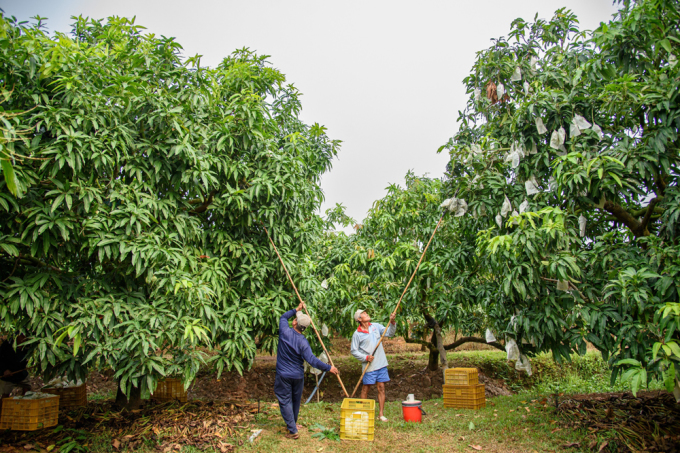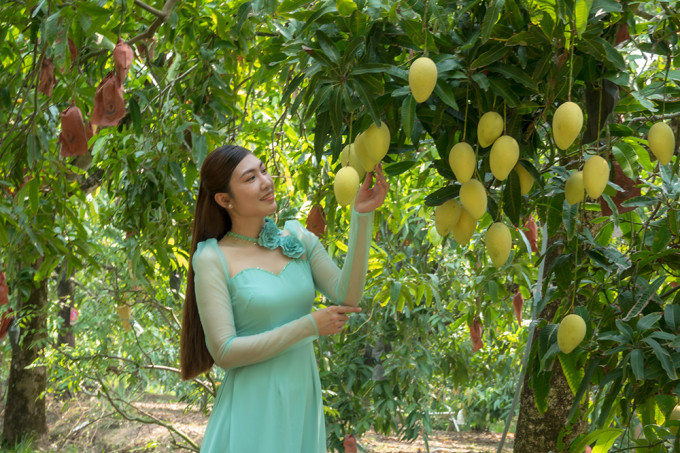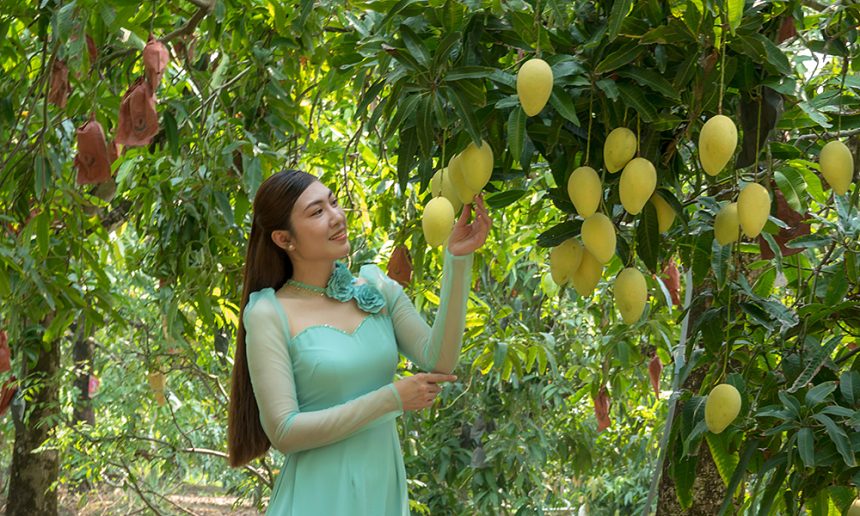Dong ThapMany farmer households have built community experience models in mango gardens to attract tourists and introduce specialties to a large number of people nationwide.
Tu Mach mango garden of old farmer Nguyen Van Mach in My Xuong commune, Cao Lanh district opened to welcome visitors from April 2022, and is currently one of the attractions attracting local tourists and neighboring provinces. The garden has an area of 8,000 m2, each crop yields about 12 tons of mangoes. After more than a year, the garden has welcomed more than 1,500 visitors and experiences.
Mr. Mach said that he does not only do tourism for economic purposes, but also wants to introduce tourists to his hometown’s specialty mango. “Doing experiential tourism is more difficult than producing, because we have to take care of the mangoes even more, while creating a beautiful, comfortable landscape for tourists to visit.”
Along with Mr. Mach, many households in Cao Lanh district also do tourism and formed My Xuong Tourist Village. Like Mr. Le Phuoc Tanh, Tan Thuan Tay commune, Cao Lanh city renovated a 1,500 m2 garden into a community tourism attraction including visiting mango gardens, experiencing fishing activities, and enjoying cuisine. West…
Mango is one of the key products of Dong Thap when implementing the project of agricultural restructuring, converting rice growing areas to 2025, with a vision to 2030. To increase the value of mangoes as well as increase income from mangoes, the government and farmers have implemented many solutions from planting to harvesting, processing and marketing products.
Accordingly, the province has organized the development of the mango industry along the value chain, forming many large-scale concentrated growing areas in Thanh Binh district, Cao Lanh district and Cao Lanh city. The two main mango varieties grown in the province are Cat Chu (accounting for 60% of the total area) and Hoa Loc (accounting for 40% of the total area).

A mango garden in Dong Thap. Image: Electronic information portal of Dong Thap province
Along with reorganizing production, cooperatives also changed their production thinking, focusing on improving quality and promoting processing. In Dong Thap, mango production is applied science and technology in a safe, sustainable direction, with traceability and linkage to consumer markets. The province has nearly 300 areas granted codes, with more than 8,000 hectares. Organic mango production models such as that of farmer Nguyen Phu Hiep (My Hoi commune, Cao Lanh district), and the organic composting model of watering mangoes of Tam countryside Hoi Quan (Tan Thuan Tay commune, Cao Lanh city). ..
Since 2019, the brand “Xoai Cao Lanh” has been protected by the National Office of Intellectual Property and has been granted the geographical index “Cao Lanh” for the product.
In addition to the domestic consumption market at traditional markets, supermarket systems, and shopping centers, Dong Thap mangoes have been listed on e-commerce platforms and exported directly to many markets such as: EU, US, Australia, the Russian Federation, Japan, China, Korea… This is the result of Dong Thap applying digital transformation to mango production and consumption. For example, Ba Ket Mango Cooperative Group (My Hoi commune, Cao Lanh district), during Covid-19, used social networks to promote products, combined with agricultural products websites to create traceability stamps, and set up a fanpage. specifically for product transparency… thanks to which it is trusted by customers.
“Mangoes of the Ba Ket Mango Cooperative Group have been granted growing area codes, managed on Kipus software, including managing electronic logs to issue stamps with QR codes, participating in Postmart’s e-commerce trading floor. Thanks That way, we can sell a larger amount of goods and qualify for OCOP product registration,” said Mr. Nguyen Phu Hiep, head of Ba Ket Mango Cooperation Group.
Mr. Nguyen Phuoc Thien, Vice Chairman of the Provincial People’s Committee, said that Dong Thap has created special planting area codes aimed at markets with great demand for mangoes, assigned to cooperatives, association halls, district and commune level agencies to manage. regarding the state.
“The province will create all conditions, as well as share for businesses to use growing area codes with conditions that ensure transparency and responsibility with the goal of developing this specialty,” Mr. Thien said.
In addition to fresh fruit, Dong Thap mangoes are also processed into mango wine, mango jam, dried mangoes, mango powder, mango syrup, mango cakes… Businesses also develop processes for using and recycling by-products. created during the production process, such as processing mango peels and seeds to create animal feed, fertilizer… forming circular economy business models in the mango processing industry.

A Dong Thap mango garden is invested to become a tourist destination. Image: Electronic information portal of Dong Thap province
To exploit the potential of mango trees, Dong Thap province organized “Dong Thap Mango Festival 2023 – Raising its position”, on a provincial scale for the first time. During the 4 days of the event (April 28 – May 1), about 150,000 people came to visit and experience the activities. At the event, Dong Thap Mango Industry Association launched.
According to data from the Dong Thap Department of Agriculture and Rural Development, in 2023, the mango growing area will be about 14,000 hectares, accounting for 33.7% of the province’s total fruit growing area. Output reaches about 150,000 tons per year. The Provincial People’s Committee plans that by 2025, the mango growing area will reach 36% of the total local fruit growing area; Synchronously applying science and technology to the production process, increasing income for gardeners, setting a target of increasing profits by at least 15% a year…
Kim Anh



